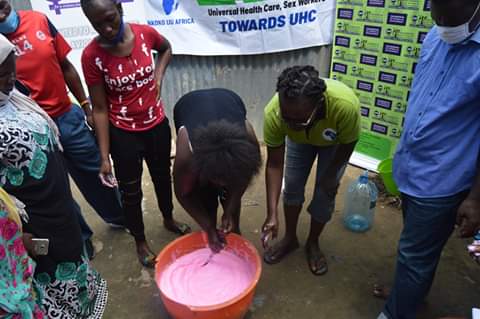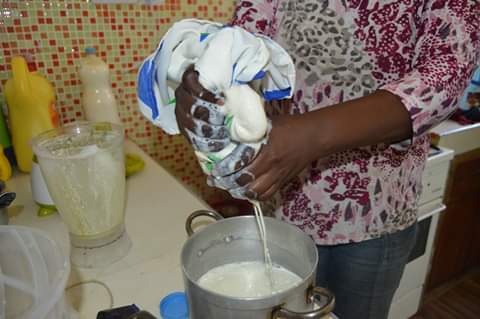Sex Workers’ Dilemma Amid COVID-19 Crisis

A section of sex workers during an empowerment program by Nkoko Iju Africa a Mombasa based NGO. Image: PETER KOMBE
MCK PROJECT 1
By PETER KOMBE
Email: thecoastnewspaper@gmail.com
Commercial sex workers in Mombasa are in a catch-22 situation following curfew and cessation measures to contain the spread of COVID 19 within and without the county that is the second hardest hit after Nairobi County.
Concerned by the fate of sex workers’ survival during this time of the country battling to flatten the pandemic curve, a lobby group, Nkoko Iju Africa, wants them supported morally and financially to get through this crisis.
The dusk-to-dawn measures and shutting down of bars and nightclubs have plunged the vulnerable and marginalized commercial sex workers operating within the County’s central business district (CBD) and five suburbs of Likoni, Changamwe, Jomvu, Kisauni and Nyali.
According to the Ministry of Heath there are more than 133,674 female sex workers in the country who can no longer leave their homes in the evening or night to eke a living for their families.
With loss of income and no savings, many a sex workers’ survival or suffering is simply unknown and probably engaging in alternative ways and means that can expose them directly to the COVID 19 infections.
INFORMAL ECONOMY
Speaking in Mombasa recently, the lobby group executive director Marylyne Laini says they have kicked off awareness programs aimed at economically empower workers within the county.

“This is an alternative way of empowering sex workers and we are appealing to the county government and well-wishers to donate resources like blenders and other equipment that can be used to generate income.”
Without elaboration, the director claims over 90 percent of the teenage mothers in the County transit to sex work and that the strict measures imposed had adversely affected their livelihoods from their clientele.
Most of the County’s suburbs are dotted with informal settlements which survive below the poverty line thus forcing many of its inhabitants to become commercial sex workers to fend for their families.
The economic empowerment program being fronted by the lobby group include making milk from soya beans, making charcoal from charcoal powder sand and/or cow dung and making shower jelly or Jik making.

One of the Nkoko Iju Africa board member, Elizabeth Mbuli, wants the sex workers to embrace the informal economy rather than continue relying on commercial sex adding that most of their lives have become unbearable in the County.
“We hope this program will an eye-opener to them so that they can use alternative ways and means to eke a decent living without necessarily using their bodies as source of livelihood,” she says.
ABUSE AND VIOLENCE
Kenya Sex Workers Alliance (KESWA) has been in the forefront in fighting against sex workers’ abuse and violence that it says has been on an upward rise during the COVID 19 curfew and cessation countrywide.
The country does not criminalize sex work but the law forbids ‘living on the earnings of sex work’ and ‘soliciting or importuning for immoral purpose’ which means the women work in a grey area.

